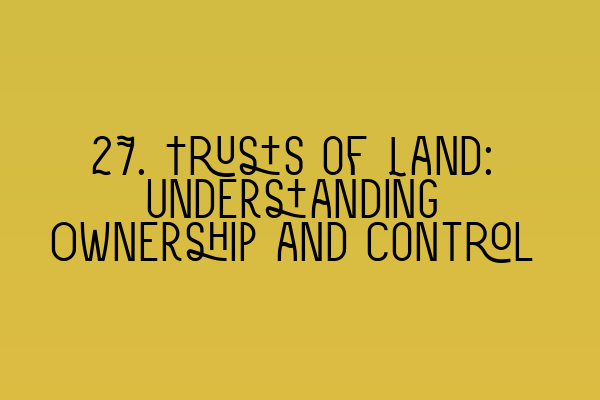27. Trusts of Land: Understanding Ownership and Control
Welcome to SQE Property Law & Land Law’s blog post on trusts of land. In this article, we will provide you with a clear understanding of ownership and control in trusts of land. Whether you are a solicitor, law student, or simply interested in property law, this post will provide you with valuable insights.
Before diving deep into trusts of land, let’s briefly explain what a trust is. A trust is a legal arrangement where one party, known as the settlor, transfers assets to another party, known as the trustee, to hold and manage for the benefit of a third party, known as the beneficiary. Trusts of land specifically deal with the ownership and control of land.
Understanding ownership in trusts of land is crucial. Generally, there are two types of ownership: legal ownership and beneficial ownership. Legal ownership refers to the registered owner of the land as per the Land Registry records. On the other hand, beneficial ownership refers to the person who has the right to enjoy the benefits and income from the land. In trusts of land, these two types of ownership can be held by different parties.
Control is another aspect to consider in trusts of land. The control of the land can be divided between the trustees and the beneficiaries. Trustees have the legal responsibility to manage the land, make decisions, and deal with any legal matters concerning the land. On the other hand, beneficiaries have the power to influence the trustees’ decisions and can potentially seek court intervention if they disagree with the trustees’ actions.
Now that we have a basic understanding of ownership and control in trusts of land, let’s explore the different types of trusts that can be created:
Bare Trusts
A bare trust is the simplest form of trust. In a bare trust, the legal and beneficial ownership of the land is held by the same party, usually the beneficiary. The trustees have no control or decision-making power over the land, and they must act as directed by the beneficiary. This type of trust is commonly used when a trustee holds the legal title for administrative convenience and the beneficiary is intended to enjoy all the benefits of the land.
Express Trusts
Express trusts are created by a specific written agreement, such as a trust deed or will. In express trusts, the legal and beneficial ownership can be held by different parties. The trustees are responsible for managing the land and making decisions in accordance with the terms of the trust. The beneficiaries have the right to receive the income or proceeds from the land as outlined in the trust agreement.
Resulting Trusts
Resulting trusts arise when there is no express agreement, but it is presumed that the legal ownership should be held by someone other than the registered owner. This can occur when there is a financial contribution made by a party other than the registered owner towards the purchase of the property. In resulting trusts, the beneficial ownership and control may be held by different parties, depending on the circumstances.
Constructive Trusts
Constructive trusts arise when there is no express agreement, but it is deemed just and equitable for a party to hold the legal ownership for the benefit of another. This can occur in situations where there is a breach of trust, fraud, or where it is necessary to prevent unjust enrichment. Constructive trusts are created by the court and aim to remedy any unfairness or wrongdoing that may have occurred.
Understanding the various types of trusts of land is fundamental for any legal professional dealing with property law. At SQE Property Law & Land Law, we provide comprehensive preparation courses for the Solicitors Qualifying Examination (SQE) to enhance your knowledge and expertise in this complex area of law. If you are looking to excel in your career or need assistance with your SQE preparation, check out our SQE 2 Preparation Courses and SQE 1 Preparation Courses.
In conclusion, trusts of land involve the understanding of ownership and control. Legal and beneficial ownership may be held by different parties, and control can be divided between trustees and beneficiaries. The type of trust created determines the rights and responsibilities of each party involved. By grasping these concepts, you will be well-equipped to navigate trusts of land in your legal practice.
For more practice material and exam guidance, make sure to check out our SQE 1 Practice Exam Questions and SQE 1 Practice Mocks FLK1 FLK2. Stay updated with the latest SRA SQE Exam Dates to ensure you are on track with your exam preparations.
